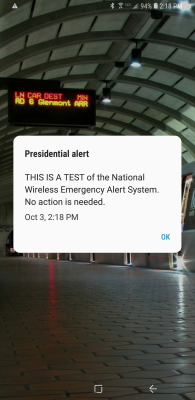Please do not put me in a position where I have to defend Donald Trump…
4 minute read
October 4, 2018, 8:04 AM
At 2:18 PM on October 3, a presidential alert went out to everyone’s mobile phones. It was accompanied by the classic emergency tone, and looked like this:
This was a live test of the capabilities and effectiveness of the national capabilities of the Emergency Alert System (EAS) for mobile phones. And apparently, the test was successful.
After the alert went out, social media was buzzing about it, mostly criticizing Donald Trump. I admit that I joined that bandwagon, posting the above screenshot with the caption, “Donald says hello.” The reactions that I saw to the alert message were a bit disappointing. Here are a few samples culled from Facebook:
“It’s a horrendous moment.”
“I would argue that action is exactly what is needed.”
“Did you get a presidential emergency alert? Ugh. The emergency IS the president!”
“I know this was a ‘test’. Something tells me that some crazy ass [expletive] is about to happen.”
“I came to the conclusion, the Presidential alert BS is just to instill fear.”
The vibe that I got from these messages, and others on Facebook, is that people really don’t understand how EAS works, and thought that it was all about politics. Some of those sorts of comments came from people who really ought to understand how this stuff works. Seeing those people make those sorts of comments just kills their credibility in my eyes. That lack of understanding about what EAS is about is breeding mistrust, and that could lead people to ignore any occasion when their phones go off with an emergency message, whether it’s for an attack by the Soviet Union or a severe weather event. That is a dangerous thing to happen, because that could cost lives. I was reading these reactions, and I immediately started thinking, please, people, don’t put me in a position where I’m having to defend Donald Trump. We all know my opinion about Donald Trump, and he is the last person that I want to defend. But this test needs to be defended, because it’s not a political thing at all, and shouldn’t be mistaken for one.
What we saw was really no different than something that we’ve seen for decades: tests by broadcasters of the Emergency Broadcast System, and tests of the later Emergency Alert System. The idea is to periodically test these systems to make sure that they work properly if and when they are needed. These systems typically get activated over a localized area for severe weather. The feature that was tested, a national alert, is nothing new. The capacity for presidential alerts has been in place ever since CONELRAD, which was the original emergency alert system, introduced in 1951. That system was designed only for national-scale emergency broadcasting, and not intended for local emergencies. It was never used for a real national emergency, though a few false alarms did occur. It was replaced by the Emergency Broadcast System, which is what many of us grew up with. It lasted from 1963 to 1997, and was most commonly activated for local emergencies, such as severe weather. Like CONELRAD, its national alerting capacity was never used for a real emergency – only a false alarm in 1971 caused by the issuing authority’s mistakenly running a live alert instead of the intended test alert. Likewise, the EAS, in place since 1997, has never run a real national alert other than tests.
I consider it to be somewhat telling that on 9/11, perhaps the closest thing that we’ve had to a national emergency in a very long time, EAS was never activated. I imagine that the reason was simple: the news media did a pretty good job that day in communicating all of the pertinent information, and thus there was no need for the government to cut them off and make its own broadcast over them.
Meanwhile, most troubling of all about this is that too many people think that everything about the government is politics. It’s really not. Yes, politics plays into things when it comes to policymaking, but when it comes to many functions of government, you’re dealing with career government employees who are not appointed by a political figure, and stay in their roles regardless of what party is in power. They don’t care one way or the other about politics in an official capacity, and as such, come off as the ultimate neutral figure. The meat inspectors at USDA are doing their jobs the same way regardless of who is in office. Same goes for EAS, which is administered by the Federal Emergency Management Agency (FEMA), the Federal Communications Commission (FCC) and the National Oceanic and Atmospheric Administration (NOAA). They’re all staffed by career employees who are only concerned about what the Congress or the White House are doing inasmuch as it affects how they perform their jobs. I wouldn’t trust a political figure from either party as far as I could throw them, but you have to respect the career civil service employees for being experts in their fields.
My take on this test after seeing the fallout from it is that the terminology probably needs to be changed. “Presidential alert” has got to go. The reason is that it introduces the title of a political figure into the alert, and that in turn colors the public’s perception of the alert by connecting it to politics. That’s especially so when you have a lunatic in the Oval Office like we do now. After all, most of us wouldn’t trust a political figure from either party as far as we could throw them, and I certainly wouldn’t take advice from them. And if people don’t trust the message, they won’t act on it, and that could cost lives. I suggest replacing the term with “national alert” in order to keep the focus on emergency communications, i.e. you need to take action in order to not die, and keep the politics out of it. After all, we’re almost three decades removed from the Cold War at this point. The Soviet Union is not going to bomb us. Needs and contexts have changed, and so changing it from “presidential alert” to “national alert” seems prudent in order to keep the focus where it belongs: on safety.
And when you hear your phone go off with the classic Emergency Broadcast System tone, please pay attention to it. It could mean the difference between life and death.
Categories: National politics, News










